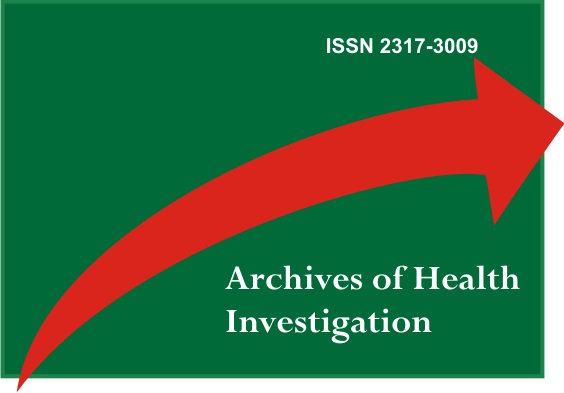Oral verrucous carcinoma: a 24-year epidemiological study and case report
DOI:
https://doi.org/10.21270/archi.v10i6.5049Palavras-chave:
Epidemiology, Carcinoma, Verrucous, Medical OncologyResumo
Introduction: Verrucous carcinoma is a non-metastatic variant of squamous cell carcinoma. It was first reported by Ackerman in 1948. It is a verrucous exophytic tumor and, although it is a rare lesion, it mainly affects the oral cavity, with slow growth and can be locally invasive. Objective: To report a case and present an observational and retrospective analysis of medical records containing biopsy data from patients diagnosed with oral verrucous carcinoma (OVC) in an oral diagnostic referral service for a period of 24 years. Material and methods: The following data were collected: age, sex, ethnicity, anatomical location and management. Result: Eight cases of OVC were found, all in Caucasian patients (n = 8, 100%), aged between 57 and 102 years. 62% of the injuries affected women. The most affected region was the jugal mucosa (n = 4, 50%). In addition, Smoking patients were not found. In all cases, incisional biopsy was performed and referral to the head and neck surgeon. Conclusion: Caucasian women in the sixth and seventh decades of life were the most affected by OVC. The absence of smoking patients corroborates the literature, which reports that cigarettes appear to be unrelated to this injury. The dentist's role is to recognize the disease early, diagnose it and refer it for medical treatment.
Downloads
Referências
Candau-Alvarez A, Dean-Ferrer A, Alamillos-Granados F, Heredero-Jung S, Garcia-Garcia B, Ruiz-Masera et al. Verrucous carcinoma of the oral mucosa: An epidemiological and follow-up study of patients treated with surgery in 5 last years. Med Oral Patol Oral Cir Bucal. 2014; 19(5):e506-11.
Koch BB, Trask DK, Hoffman HT, Karnell LH, Robinson RA, Zhen W et al. National survey of head and neck verrucous carcinoma. Cancer. 2001;92(1):110-20.
Ackerman LV. Verrucous carcinoma of the oral cavity. Surgery. 1948;23:670-78.
Mohammadi K, Mohiyuddin SMA, Harshitha N, Suresh TN, Prasad CSBR, Sagayaraj A et al. Outcome of treatment in verrucous carcinoma of oral cavity: a tertiary rural hospital experience. Indian J Otolaryngol Head Neck Surg. 2020. s12070-019-01782-z
Walvekar RR, Chaukar DA, Deshpande MS, Pai OS, Chaturvedi P, Kakade A, et al. Verrucous carcinoma of the oral cavity: A clinical and pathological study of 101 cases. Oral Oncol. 2009;45(1):47-51.
Huang TT, Hsu LP, Hsu YH, Chen PR. Surgical Outcome in Patients with Oral Verrucous Carcinoma: Long-Term Follow-Up in an Endemic Betel Quid Chewing Area. ORL J Otorhinolaryngol Relat Spec. 2009;71(6):323-28.
Neville BW, Damm DD, Allen CM, Chi AC. Patologia Oral e Maxilofacial. 4.ed. Rio de Janeiro: Elsevier; 2016.
Rekha KP, Angadi PV. Verrucous carcinoma of the oral cavity: a clinico-pathologic appraisal of 133 cases in Indians. Oral Maxillofac Surg. 2010;14(4):211-18.
Oliveira DT, de Moraes RV, Filho JFF, Neto JF, Landman G, Kowalski LP. Oral verrucous carcinoma: a retrospective study in São Paulo Region, Brazil. Clin Oral Investig. 2006;10(3):205-9.
Zhu LK, Ding YW, Liu W, Zhou YM, Shi LJ, Zhou ZT. A clinicopathological study on verrucous hyperplasia and verrucous carcinoma of the oral mucosa. J Oral Pathol Med. 2011;41(2):131-35.
Bagan JV, Jiménez-Soriano Y, Diaz-Fernandez J M, Murillo-Cortés J, Sanchis-Bielsa JM, Poveda-Roda et al. Malignant transformation of proliferative verrucous leukoplakia to oral squamous cell carcinoma: A series of 55 cases. Oral Oncol. 2011;47(8):732-35.
Gandolfo S, Castellani R, Pentenero M. Proliferative Verrucous Leukoplakia: A Potentially Malignant Disorder Involving Periodontal Sites. J Periodontol. 2009;80(2): 274-81.
Bagan J, Scully C, Jimenez Y, Martorell M. Proliferative verrucous leukoplakia: a concise update. Oral Dis. 2010:16(4):328-32.
Liu W, Shen XM, Liu Y, Li J, Zhou ZT, et al. Malignant transformation of oral verrucous leukoplakia: a clinicopathologic study of 53 cases. J Oral Pathol Med. 2011;40(4):312-16.
Hansen LS, Olson JA, Silverman S. Proliferative verrucous leukoplakia. Oral Surg Oral Med Oral Pathol. 1985;60(3):285-98.
Warshaw EM, Templeton SF, Washington CV. Verrucous carcinoma occurring in a lesion of oral lichen planus. Cutis. 2000;65:219-22.
Stephen JM, Vincent RH. Plastic surgery. 6.ed. Philadelphia: Elsevier; 2006.


